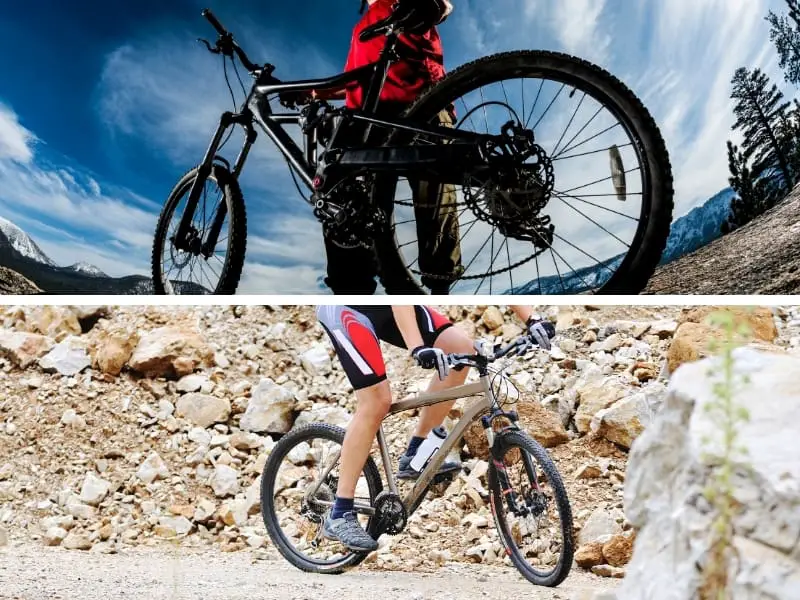In the ideal world every bike would be a perfect fit for you. But this is not the case, so is it better to have a bike too big or too small? There are advantages and disadvantages to having a bike too big or too small, but ultimately the choice is going to be a personal one.
The trouble with getting a bike that is too big or too small, is that it can make it difficult to steer or balance. The very movement of a bike depends on the weight and forces acting upon it. You are one of those forces and if the bike is not a good fit, you may not be in control of the bike.
Only you can tell how a bike feels. One bike will not feel the same for every person because we are all different. A bike that is considered too big may be easier for some to ride than one that is too small.
This guide covers some of the most common pros and cons of having a bike too big or too small, so you can figure out what to do, should you find a bike you like that is not a perfect fit.
Recommended Gear
To see all of my up-to-date recommendations for bikes and cycling gear, check out this resource that I made for you!
Table of Contents
Advantages Of Having A Bike Too Big
For children, having a bike that is too big can be great. They get a chance to grow into it. It can also be harder to control, mainly as a result of being heavier.
Having a bigger bike also means there is more room. Depending on your size and your comfort levels as well as what the bike is to be used for, a bike that is too big can be a blessing or a hindrance.
Higher Handlebars
A bike that is too big will have higher handlebars. This keeps the body positioned more upright which is better for the neck, shoulders, and head.
Only when you are racing do you want your body to lean forward for improved aerodynamics. For regular riding, it is advantageous to have higher handlebars and a more upright and natural posture.
More Comfort
The longer frames with a bike that is too big provide more leg room and therefore more comfort. This is especially great for taller individuals, so their knees do not get locked.
For longer bike rides, a bigger bike gives more comfort and leisure. The bigger the frame, the more room you have, which also means your body is not hunched over as you ride. For longer rides, this is essential for comfort.
Smoother Ride
A bigger bike means that any shock is better absorbed. Tiny bumps in the road or going up and down sidewalks can be minimized with a bigger bike. The less shock you feel, the less jittery the bike is. So, you get a smoother ride.
Nobody wants to continually have the seat knocking against them and their arms shaking. Going with a bike that is a little too big keeps your ride smooth.
Disadvantages Of Having A Bike Too Big
As mentioned briefly, a bike that is too big can be hard to control. It will take a lot more effort to steer and balance a bigger bike, because it will be heavier. In addition to that, bigger usually means longer. This means you may have to stretch to reach certain parts and this is not going to be comfortable.
Too Heavy
A bigger bike will be a heavier bike. It can feel more difficult to maneuver and control. You will need to exert more effort to help keep the bike balanced and moving forward. Not being able to fully control the bike can lead to accidents.
Can’t Reach The Ground
Bigger bikes will have the seat positioned higher up on the stem. This means you may not be able to reach the ground when you need to stop. The bike will have to tilt significantly for you to reach the ground and this leaves plenty of room for injury and a dropped bicycle.
Harder To Dismount
Along with not being able to reach the ground, a bigger bike is harder to get on and off. The angle of the bike will have to be such that you can get your leg over. At the same time, you need to be able to push off to get going. When the frame is big and you are barely able to reach the ground, this makes it challenging and hazardous to both mount and dismount.
Potential Injuries
With a bike that is too big, you will have to stretch your arms out. This increases pressure on your back as it stretches which can cause injury. As mentioned, a lack of control and difficulty reaching the ground can also cause injuries.
Advantages Of Having A Bike Too Small
A bike that is too small can be made to fit. With a few changes to the stem and seat post, you can alter your smaller bike to better fit you. This is because it is easier to lengthen something.
Trying to shorten a frame past its limits is not possible and ruins the overall structure and stability of the bike. With a frame that is initially too small, you have the advantage of being able to make it slightly bigger.
Lighter Weight
A smaller frame weighs less, so is easier to control and steer. Less weight is best for beginners and children who are learning the mechanics of cycling. The last thing you want is to be bogged down with a heavy bike as you try and learn how to balance and pedal.
Easier Control
Along with lighter weight comes better control. Forward motion of a bike depends on the rider’s ability to apply force and balance. This is easier to do with a lighter and smaller bike. Ultimately you get more control over where the bike is going.
Better For Certain Activities
Better control is essential for certain types of activity. Racing, mountain biking, and performing stunts are all easier with smaller bikes. These activities require the rider to have control at all times to avoid injury, and a smaller bike is the better choice in each case.
Easier To Customize Seat
When you start with a small bike, you can always go bigger. It is easier to customize seats and stems to allow for a better fit. This gives you a lightweight frame that is better suited to your size. A bike frame that is too small can be made bigger much easier than trying to make a big bike smaller.
Disadvantages Of Having A Bike Too Small
A bike that is too small can be uncomfortable to ride. While some bikes, like BMX bikes, which are designed to be smaller than the rider, are not the easiest to ride. Unless you are looking for a lighter and smaller bike to perform tricks on, a bike that is too small can have some big disadvantages.
Need More Core Strength
A bike that is too small requires you to sit differently. Your posture is not as upright as it should naturally be. Your legs will also not fully extend at any time. This means that balance will come from the core of your body.
To maintain control over the bike, your core muscles will be working harder than leg or arm muscles, which are not extended enough to provide full power. As a result, the core muscles can be easily overworked, and you can tire easily.
Stress On Hands & Elbows
The unnatural position of your arms when reaching for a smaller handlebar puts stress on your hands, wrists, and elbows. The shorter reach does not allow your elbows to stretch and the bent positioning can lead to pinched nerves and extra stress along the arms and hands.
Back, Neck & Shoulder Pain
In the same way that position affects your arms, it will affect your back. A small bike leads to a hunched position while sitting. This increases pressure placed on shoulder, neck, and back muscles, which can cause pain and injury.
Which Is Better: A Bike Too Big or Too Small
The answer to this question is going to be based on preference. It also depends on what the bike is going to be used for. A child learning to ride a bike will fare better with one that is too small. This will help them learn to balance and gain control over the bike as it will be lighter.
People wanting to perform tricks and stunts on bikes will also do better with a bike that is too small. A lighter frame will be easier to jump around on. A bike that is too big is ideal for comfort. The bigger or longer frames provide more room and are less jittery, so are recommended for those who enjoy longer, leisurely bike rides.
For a regular cyclist, such as myself, it is better to go with a bike that is too small. They are lighter and easier to control, making them ideal for racing and mountain biking. Despite the advantages and disadvantages to both sizes, ultimately you will get more out of a bike that is too small. A bike that is too big will likely cause more trouble than the additional comfort you get is worth.
Helpful Tips To Know If It’s Better To Have A Bike Too Big Or Too Small
It is not often that you will find a perfect bike in terms of fit. When it comes to deciding if it’s better to have a bike too big or too small, there are some additional tips to keep in mind.
- Try before you buy: Always test a bike out before you purchase it to see how it fits
- What is it for: Consider what the bike will be used for. For long rides a bigger bike is better but for stunts, you want to stick with a smaller one.
- Experience: Beginners and children need lighter and smaller bikes first, until they get used to balancing and control.
Final Thoughts
Every bike is different and so is every rider. There is not one bike that will fit every person the same. So, it is better to have a bike too big or too small? In most cases a bike that is too small will be the better choice. These bikes are better for beginners, children, racing, mountain biking, and doing tricks.
With a bike that is too small, you also have the option to upgrade and make certain parts bigger. With a bike that is too big you get room and comfort, but this is something people want in cars more than they do bikes. In my opinion, with regards to bikes, good things come in smaller packages.


